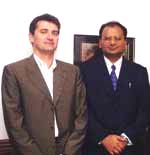Saporiti sets up base in India.
19 Jul 2000
Why does Saporiti Italia, the 50-year-old, top-of-the-line Italian furniture maker, want to set up base in India? Because, says Saporiti Italia managing director, Mr. Raffaele Saporiti, India is a big market and a growing one,. But the bigger reason is the lower production cost in India.
"Indian manufacture will bring in a price advantage of about 50 per cent," said Sudhir Mehta, managing director, Pinnacle Industries, at the all India launch of the Pinnacle Saporiti furniture in Pune. Pinnacle has entered into a joint venture with Saporiti, called Pinnacle Saporiti.
50 per cent," said Sudhir Mehta, managing director, Pinnacle Industries, at the all India launch of the Pinnacle Saporiti furniture in Pune. Pinnacle has entered into a joint venture with Saporiti, called Pinnacle Saporiti.
Pinnacle Saporiti will manufacture the Saporiti line of furniture including sofas, beds and recliners at Indore to Italian design and standards, more than half of which will be sold by Saporiti in its global markets. The rest will be marketed in India. On the anvil are 20 Pinnacle Saporiti showrooms in nine cities by the end of the year, three of which are already functional in Pune.
This is the first time in its fifty-year existence that Saporiti has ventured to manufacture furniture outside Italy. Pinnacle has had experience in manufacturing automobile seats "which was exactly the way we made our furniture," says Mr Saporiti, explaining the choice of partner.
Despite importing the special polyurethane used by Saporiti and the exclusive fabric used on its furniture, Indian manufacture will be cheaper largely due to lower labour costs. Already, Saporiti has discontinued a few of its production lines in Italy, and transferred them to the Indore facility.
Saporiti exports over 90 per cent of its products worldwide, much of it in the Far East. "Our major markets are Japan, Singapore, Hong Kong, besides Europe and North America. I had been touring South East Asia for the past three years looking for a place to set up base. My search ended with Pinnacle," says Mr Saporiti.
Pinnacle's manufacturing process for automobile seats is similar to that employed by Saporiti Italia, which uses a mild steel frame under a special polyurethane mould, upholstered in a choice of fabric covering. Another factor that influenced the setting up of the manufacturing base in India was the nature of Saporiti's business. A major chunk of its business comes from specialised contract manufacturing -- for airport and hotel lobbies, conference halls, and the like.
similar to that employed by Saporiti Italia, which uses a mild steel frame under a special polyurethane mould, upholstered in a choice of fabric covering. Another factor that influenced the setting up of the manufacturing base in India was the nature of Saporiti's business. A major chunk of its business comes from specialised contract manufacturing -- for airport and hotel lobbies, conference halls, and the like.
"Fifty per cent of Saporiti's $ 40 million business comes from such special projects," says Mr Saporiti, which have included, among others, the United Nations Organisation headquarters in Geneva, the Food and Agriculture Organisation conference centre in Rome, the Sheraton Luxury Collection at Grand Hotel Patria in Lecce, the Banque Generale du Luxembourg in Luxembourg City.
"The Indian production process lends itself well to this kind of manufacture, which calls for customisation of what essentially is an industrial production process," says Mr Saporiti (see Pinnacle Saporiti to supply sofas to Roman hotel).
For the Indian lover of Italian furniture too, it's good news. With import duties and taxes coming to over 70 per cent on the imported stuff, the made-in-India Italian furniture works easy on the pocket. Saporiti's base price range extends from about Rs 12,000 for a single seat convertible to Rs 100,000 for a five-seater settee, with variations according to the choice of upholstery fabric.
Mr. Mehta estimates the Indian furniture market to be over Rs 20,000 crore, and growing at the rate of 15 per cent. The largest share of this market comes from the household segment, at 65 per cent, with hotels accounting for 12 per cent and the corporate sector, 15 per cent. The Indian furniture industry, however, has been largely fragmented and unorganised. The entry of Pinnacle Saporiti adds to a growing trend, in furniture-making, of industrialising a product that has been largely custom-made.
"A parallel can be drawn with the Indian market for shirts. Until a few years ago, the only way was to get them tailored. Now you have a whole array to choose from, with every top name in shirts from Arrow to Peter England here," says Mr Mehta.
So, too, in the furniture market. What with the likes of Gautier, Camel, and now Saporiti?



















